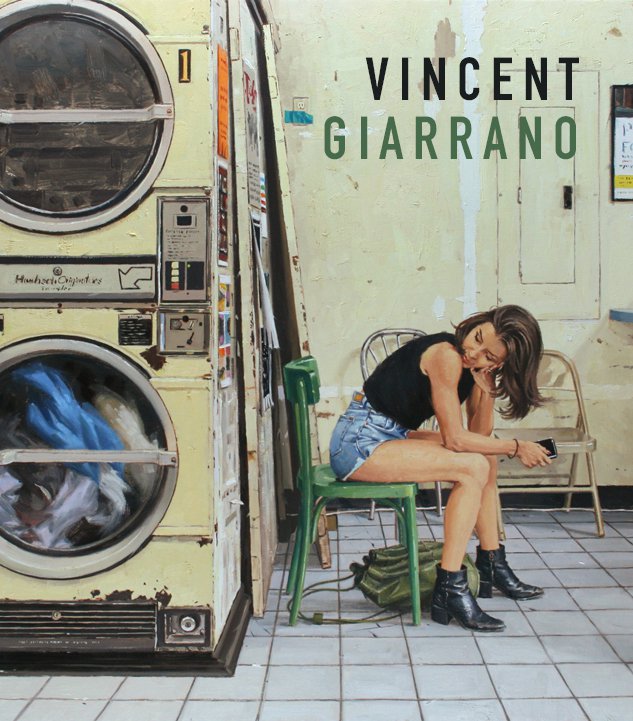
Vincent Giarrano
Close your eyes just a second too long and the figures in Vincent Giarrano’s street scenes and interiors could easily walk away, disappearing into an unseen world lingering on the edge of the canvas. His paints hold them still, but their lives are ready to move forward.
“My paintings are sort of fleeting, They don’t linger in one place for long, and only the paint keeps them there” the Connecticut-based painter says. “It’s a slice of life. They are people you might see for a split second while walking down the street. Your eye is drawn to them, and in a second they’re gone.”
Through painterly depictions of urban street life, Giarrano captures moments in time – snapshots of everyday experiences. For Giarrano, beauty is found in the sincere and uncontrived and in “small, quiet moments (that) can speak volumes.”
Artist:
Vincent Giarrano
MUSEUM EXHIBITIONS
• The Butler Institute of American Art, National Midyear Show, June 26 – August 28, 2016
• The Butler Institute of American Art, National Midyear Show, July 19 – September 7, 2015
• Fort Wayne Museum of Art, Contemporary Realism Biennial 2014, Sep. 20, 2014 – Nov. 30, 2014
• The National Portrait Gallery, Smithsonian Institution, Washington DC, Outwin Boochever Competition, March 2013 – Feb. 2014
• The National Portrait Gallery, London, UK, BP Portrait Award 2013, June 20 – Sept. 15, 2014
• Aberdeen Art Gallery, BP Portrait Award 2013, Nov. 2, 2013 – Feb. 1, 2014
• Wolverhampton Art Gallery, BP Portrait Award 2013, March 1, 2014 – June 14, 2014
SELECT SOLO EXHIBITIONS
• Gallery Henoch, NYC, New York City Women, June 15 – July 8 2017
• Susan Powell Fine Art, Madison, CT, City Life, August 5 – September 16 2016
• Susan Powell Fine Art, Madison, CT, New Paintings, November 6 – December 5 2015
• Haynes Galleries, Nashville, TN, Life in the City, April 24 – May 5 2015
• Susan Powell Fine Art, Madison, CT, New York City, August 15 – September 14 2014
• Susan Powell Fine Art, Madison, CT, New Paintings, Nov. 1 – Dec. 1, 2013
• Haynes Galleries, Nashville, TN, Truth and Beauty, April 12 – May 18 2013
• Behnke Doherty Gallery, Washington, CT, Passages, May 17 – June 23 2013
• Susan Powell Fine Art, Madison, CT, New Paintings, August 16 – September 30 2012
• Waterhouse Gallery, Santa Barbara, CA, One-man Show, March 25 – April 6, 2012
• Susan Powell Fine Art, Madison, CT, NYC Street Scenes, May 13 – June 19, 2011
• Susan Powell Fine Art, Madison, CT, New York Scenes, May 7 – June 13, 2010
• Susan Powell Fine Art, Madison, CT, New York Soho Paintings, Dec 11 – Jan 31, 2009
SELECT GROUP EXHIBITIONS
• Susan Powell Fine Art, Madison, CT, Spring into Art, March 10 – April 1, 2017
• Susan Powell Fine Art, Madison, CT, Still Life Invitational, April 7 – May 13, 2017
• Susan Powell Fine Art, Madison, CT, Spring into Art, March 11 – April 2, 2016
• Susan Powell Fine Art, Madison, CT, Annual Holiday Show, Dec. 10 2015 – Jan. 31, 2016
• Gallery 1261, Denver, CO, The Renaissance of Realism, Nov. 13 – Dec. 5 2015
• Gallery 1261, Denver, CO, The City, Oct. 5 – Oct. 26 2013
• Bennington Center for the Arts, Bennington, VT, Artists for the New Century, June 9 – July 15 2012
• Susan Powell Fine Art, Madison, CT, Along the Shore, July 19 – August 12, 2012
• Behnke-Doherty Gallery, Washington, CT, Bare Essentials, August 11 – September 18, 2011
• Tree’s Place, Orleans, Ma, Summer Salon, July 30, 2011
• Enid Lawson Gallery, London, United Kingdom, January 2011
• Susan Powell Fine Art, Madison, CT, Holiday Exhibition, Dec 9, 2010
• Gardner Colby Gallery, Naples, Florida, December 2010
• Waterhouse Gallery, Santa Barbara, CA, The Great American Figurative Show, November 20, 2010
• Susan Powell Fine Art, Madison, CT, NYC Viewpoints and CT Scenes, Dec 11 – Jan 31, 2010
• Behnke Doherty Gallery, Washington, CT, American Luminosity, Aug 6 – Sep 19, 2010
• The Forbes Galleries in NYC, A Contemporary View of Women Reading, February 10, 2010
• Waterhouse Gallery, Santa Barbara, CA, Figurative Exhibition, November 22, 2008
• Grenning Gallery, Sag Harbor, NY, Introducing, October 25, 2008
• Grenning Gallery, Sag Harbor, NY, Local Landscape Show, September, 2008
• Susan Powell Fine Art, Madison, CT, Along the Shore, Jul 11 – Aug 10, 2008
• Susan Powell Fine Art, Madison, CT, Three Takes on Realism, Jul 11 – Aug 10, 2008
• Salmagundi Club, Non-members Exhibit, NY, 2007
• Greenhouse Gallery, San Antonio, TX, Salon International 2007
• Greenhouse Gallery, San Antonio, TX, Salon International 2006
• Connecticut Academy of Fine Arts, Annual Exhibition, Mystic, CT, 2006
AWARDS, HONORS AND COMPETITIONS
• The Artist’s Magazine Annual Competition, 2015, honorable mention in portrait/figure
• America China Oil Painting Artists League Competition, Finalist 2011
• The Artist’s Magazine 27th Annual Competition, 2010 Second place in Wildlife, Spring Robin
Honorable mention in Landscape, Japanese Girls
• Washington Art Association, Members Show 2009, Honorable Mention
• The Artist’s Magazine 25th Annual Competition, 2008, finalist in Landscape & Still Life
• Greenwich Arts Council, Greenwich, CT, Faces of Winter 2008, Daniel Greene-Judge
• The Artist’s Magazine Competition, 2007
• Salon International, Greenhouse Gallery, San Antonio, TX, 2007
• Salon International, Greenhouse Gallery, San Antonio, TX, 2006
• Salon International, Greenhouse Gallery, San Antonio, TX, 2005


